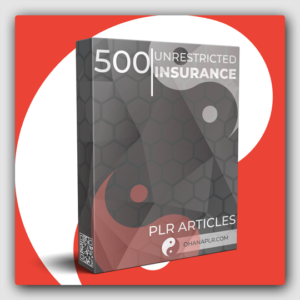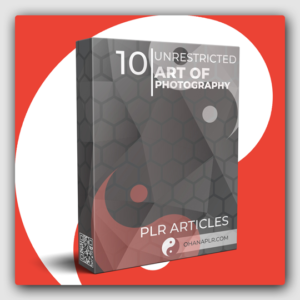Full Description
500 Unrestricted Insurance PLR Articles
In this PLR Article Pack, You will get 500 Unrestricted Insurance PLR Articles with Private Label Rights to assist you in dominating the Financing market.
These Information PLR articles are available in a Zip folder containing the Text file format product, and its license.
It can be instantly downloaded after the purchase is confirmed.
How Can You Use This PLR Article Pack?
- For Internet Marketing, Affiliate Marketing
- Reselling
- List Building
- Blogging
What Can You Do With This Information PLR Article Pack?
- Convert it into an E-course and resell it
- Use it on your blog
- Create an autoresponder series.
- You may use it to build your email list
- covert it into any kind of digital or physical info product which you can resell with a Personal Use Only License (PUR) only.
500 Unrestricted Insurance PLR Articles
The Titles in This Product are:
- 3 Warnings Before Switching Auto Insurance Companies
- 3 Ways Your Health Insurance Company Is Scamming You
- 3 Ways Your Life Insurance Company Is Scamming You
- 4 Reasons To Get An On Line Auto Insurance Quote
- 4 Things To Remember When Renewing Your Home Contents And Home Buildings Insurance
- 5 Basic Facts About Health Insurance Policies In A Bad Economy
- 5 Easy Steps To Lower Your Auto Insurance Quote
- 5 Quickest ways to lower your Auto Insurance Premium
- 5 Quickest ways to lower Your Health Insurance Premium
- 5 Quickest ways to lower your Life Insurance Premium
- AND 490 MORE!
Here is a Sample Snippet of what you can expect inside this package
Article Body:
Health savings accounts (HSAs) are wildly popular. Since their introduction in 2004, approximately 2.5 million Americans have enrolled in these so-called consumer-driven health plans. But, alas, HSA plans are not for everyone.
Here are some pointers to help you consider whether an HSA will benefit you and your family.1. An HSA plan can cut healthcare costs by an average of 40% for many people.
Nevertheless, some people will not realize any net savings. Those most likely to realize significant savings are people who pay all of their own health insurance premiums, such as the self-employed, who are relatively healthy with few medical expenses.
2. <a href=”http://www.hsahealthplans.com “>health savings plan </a> restores freedom of choice.
An HSA plan puts individual consumers back in control of their own health care. This also means that each individual must be more responsible for his or her own health care decisions. This approach of self-reliance is not always popular with or appropriate for everyone, especially those who have become comfortable with HMO-type “co-pay” plans.3. <a href=”http://www.hsahealthplans.com “>Health savings accounts</a> reduce income taxes.
Every dollar contributed into your HSA account is deducted from your taxable income in the same manner as contributions into a traditional IRA account–regardless of whether you spend it or just save it. Interest and investment earnings in a HSA accumulate tax-deferred, just like a traditional IRA. Unlike an IRA, withdrawals are tax-FREE when used to pay qualifying medical expenses. In many situations, new account holders are able to almost fully fund their HSA with money saved on premiums from a prior, higher priced plan. By stashing all or most of those savings into an HSA, the account holder realizes instant, additional savings in the form of reduced taxes.4. You must have a properly qualified high health insurance policy in place first before
you can open a health savings account. One of the biggest misconceptions about HSA plans is that any insurance policy with a high deductible will qualify the policyholder to establish an HSA account. IRS regulations, however, are quite specific. Not just any policy with a so-called “high deductible” will suffice. It is important to be certain that you are insured under a properly qualified policy. Your best bet is to work with a qualified and duly licensed health insurance broker who is experienced in marketing properly qualified HSA plans.5. You must be insurable in order to qualify for the HSA-qualified health insurance policy.
Because most people do not have a properly qualified high deductible insurance policy, they will need to switch insurance plans in order to become HSA-eligible. Unless coverage is being offered under small group reform laws (generally groups with 2-49 employees), the new high deductible policy will be individually underwritten by an insurance company. This means that some “pre-existing” conditions may not be fully covered. Alternatively, some companies may opt to cover certain “pre-existing” conditions in exchange for slightly higher premiums. Unfortunately, some health conditions simply render an individual uninsurable (examples: diabetes, chron’s disease, heart attack, etc.). Underwriting requirements vary by state, which is another reason to rely on an experienced health plan broker.
You should not switch to a HSA plan when the management of existing medical expenses is more important than saving up-front medical insurance premiums. Do not change health plans: in the middle of ongoing medical treatments; after a major health issue has been diagnosed; or if any family member is pregnant.
Generally, it is relatively hassle-free to qualify, i.e. no medical exams, etc. Most insurance companies offering HSA coverage will issue based on your application answers, perhaps accompanied by a follow-up telephone interview. In some cases, medical records may be requested, and companies always reserve the right to order a paramed exam.6. Although HSA insurance premiums are low, they are not always as low as you might expect.
This happens for one main reason. Simply stated, the underlying insurance policy is just that—a health insurance policy. Although it has a “high” deductible, as required by law, the insurance company still must compensate for the risk it is assuming over the deductible amount, which it does by charging premiums. Many companies offer policies with “one deductible” that all family members contribute toward. With those plans, it is not uncommon for premiums for a 5000 family deductible with 100% coverage after the deductible to be comparable to a 2500 “per person” deductible plan with 80/20 coverage after the deductible.
Lower premiums represent just one element of the lower net cost achieved with an HSA plan. The low net cost of an HSA plan is achieved after factoring in the benefits of lower taxes, made possible by the tax-deductible contribution to the HSA account. Thus, if obtaining the lowest possible gross premium is your main concern, you may wish to consider a high deductible, non-HSA policy, especially if you do not see the benefit to contributing to a tax-deductible savings account.7. An HSA offers your best chance to keep a lid on health insurance rate increases.
Make no mistake-you will have rate increases with your HSA insurance policy. Because an HSA qualified policy is still a health insurance policy at heart, there is no logical reason to presuppose that an HSA policy would be immune to rate increases required by an insurer to keep paying claims and stay in business. But what you can expect is that the actual dollar amount of any future rate increases will be substantially lower compared to traditional health insurance plans (regular PPO and HMO plans). This is true because insurers base increases on percentages, and the same percentage of a lower base premium results in a lower dollar increase. It’s not a perfect solution-but it is the most cost-efficient solution for many qualified people.
License Details:
[YES] You get all the articles with private label rights
[YES] You can brand the articles with your name
[YES] You can edit the articles
[YES] You can use the articles to create an autoresponder email series
[YES] You can use articles as web content
[YES] You can use articles as content for your ebooks
[YES] You can use articles as content for your reports
[YES] You can use articles as content for your off-line publications
[YES] You can use translate all articles to any language you want
[YES] You can sell the articles
[YES] You can sell them with resale rights
[YES] You can sell them with master resale rights
[YES] You can sell them with private label rights
[YES] You can add them to your membership sites
[YES] You can sell them on auction sites
[YES] You can use them to build your list
[YES] You can give them as a bonus
[YES] You can package them and sell the packages in any way you want
[YES] You can start a membership site and deliver articles to your members
[NO] You cannot give them away for free under any circumstances
Join Our Family
Members of the Ohana Family are entitled to loads of perks including downloading this product at no additional cost.






 Protected by Patchstack
Protected by Patchstack
Reviews